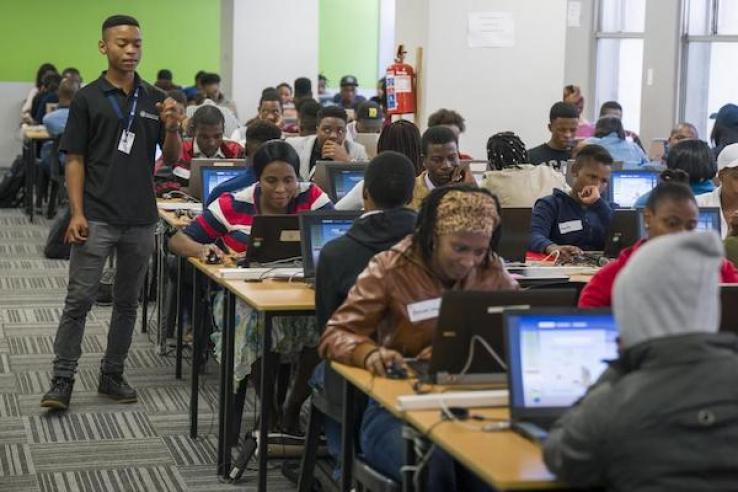Displaying 7036 - 7050 of 7781
Event
This webinar explored the potential for education interventions to improve social inclusion at scale, with a focus on studies in partnership with education ministries from different settings across Europe.
Update
J-PAL updates
J-PAL North America announces that Laura Feeney and Vincent Quan, who previously led the center’s research, training, and policy teams, are now serving as the new co-executive directors of the organization.
Blog
Read how J-PAL Africa and the Harambee Youth Employment Accelerator have partnered over the last three years to design, test, and scale job search tools to address South Africa's youth unemployment problem.
Person
Nada Zaky is a Policy Associate at J-PAL Middle East and North Africa where she works on the labor markets and education sectors. In her role, she works on synthesizing lessons from across research and shares these lessons with policymakers, practitioners, and donors to help them integrate rigorous...
Blog
GEA has completed its second full funding round, supporting nineteen research teams to produce evidence that addresses critical knowledge gaps on what works to support women’s economic agency. Read about the funded projects.
Update
J-PAL updates
In the November 2021 Newsletter, we highlight ideas around how climate finance can support evidence generation, three key lessons on informing policy with evidence in Africa, and evidence for medical debt relief.
Resource
Basic page
Person
Hamza W. Hammad is a Policy Associate at J-PAL Middle East and North Africa, where he works on the Gender sector. In this role, he supports the synthesizing of evidence in policy publications, translating global evidence to local contexts, and helping develop new research partnerships.
Person
Alif Azadi Taufik is a Senior Research Associate at J-PAL Southeast Asia, where he works as part of the Inclusive Financial Innovation Initiative.
Person
Al Nurulloh Kahfi B. Sya is a Research Associate at J-PAL Southeast Asia. Right now he works on the impact evaluation of Kartu Prakerja, a program launched in early 2020 that aims to improve the workforce's skills and competencies in Indonesia.
Person
Liza Setya Eka Hasul is a Research Associate at J-PAL Southeast Asia. She is currently working on a randomized trial to assess the impact of home-based growth chart on child linear growth in Indonesia.
Blog
In the second installment of the IFII blog series, we discuss the importance of applying a gender lens to measuring impact and share practical considerations for measuring empowerment.
Evidence to Policy Case Study
Case study
J-PAL staff and affiliates contributed to the creation of the Office of Evaluation Sciences (OES) to improve the capacity of US federal agencies to build and use rigorous evidence and continue to partner with OES to aid this mission.
Evidence to Policy Case Study
Case study
Researchers applied insights from earlier Covid-19 messaging research to launch a large-scale Facebook messaging campaign and corresponding evaluation reaching more than 35 million people.
Evaluation
Researchers evaluated the impact of financial incentives, public health video messages, and access to a vaccine scheduling link on Covid-19 vaccination intentions and vaccine take-up in the United States. None of the interventions led to increases in vaccine take-up after thirty days. In a subsequent study, researchers found that personal reminder messages led to increases in booster vaccination rates while monetary incentives had no additional impact.







